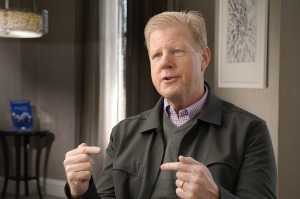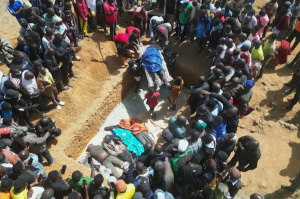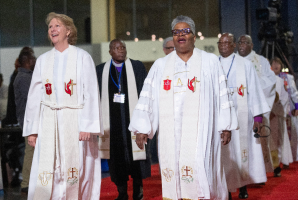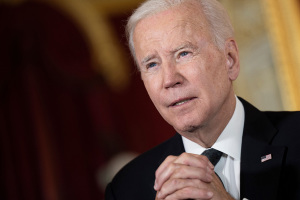Complete Text of Remarks by President Barack Obama to the United Nations General Assembly 2014
America is pursuing ambitious reductions in our carbon emissions, and we've increased our investments in clean energy. We will do our part, and help developing nations do theirs. But the science tells us we can only succeed in combating climate change if we are joined in this effort by every other nation, by every major power. That's how we can protect this planet for our children and our grandchildren.
In other words, on issue after issue, we cannot rely on a rule book written for a different century. If we lift our eyes beyond our borders -- if we think globally and if we act cooperatively -- we can shape the course of this century, as our predecessors shaped the post-World War II age. But as we look to the future, one issue risks a cycle of conflict that could derail so much progress, and that is the cancer of violent extremism that has ravaged so many parts of the Muslim world.
Of course, terrorism is not new. Speaking before this Assembly, President Kennedy put it well: "Terror is not a new weapon," he said. "Throughout history it has been used by those who could not prevail, either by persuasion or example." In the 20th century, terror was used by all manner of groups who failed to come to power through public support. But in this century, we have faced a more lethal and ideological brand of terrorists who have perverted one of the world's great religions. With access to technology that allows small groups to do great harm, they have embraced a nightmarish vision that would divide the world into adherents and infidels -- killing as many innocent civilians as possible, employing the most brutal methods to intimidate people within their communities.
I have made it clear that America will not base our entire foreign policy on reacting to terrorism. Instead, we've waged a focused campaign against al Qaeda and its associated forces -- taking out their leaders, denying them the safe havens they rely on. At the same time, we have reaffirmed again and again that the United States is not and never will be at war with Islam. Islam teaches peace. Muslims the world over aspire to live with dignity and a sense of justice. And when it comes to America and Islam, there is no us and them, there is only us -- because millions of Muslim Americans are part of the fabric of our country.
So we reject any suggestion of a clash of civilizations. Belief in permanent religious war is the misguided refuge of extremists who cannot build or create anything, and therefore peddle only fanaticism and hate. And it is no exaggeration to say that humanity's future depends on us uniting against those who would divide us along the fault lines of tribe or sect, race or religion.
But this is not simply a matter of words. Collectively, we must take concrete steps to address the danger posed by religiously motivated fanatics, and the trends that fuel their recruitment. Moreover, this campaign against extremism goes beyond a narrow security challenge. For while we've degraded methodically core al Qaeda and supported a transition to a sovereign Afghan government, extremist ideology has shifted to other places -- particularly in the Middle East and North Africa, where a quarter of young people have no job, where food and water could grow scarce, where corruption is rampant and sectarian conflicts have become increasingly hard to contain.
As an international community, we must meet this challenge with a focus on four areas. First, the terrorist group known as ISIL must be degraded and ultimately destroyed.
This group has terrorized all who they come across in Iraq and Syria. Mothers, sisters, daughters have been subjected to rape as a weapon of war. Innocent children have been gunned down. Bodies have been dumped in mass graves. Religious minorities have been starved to death. In the most horrific crimes imaginable, innocent human beings have been beheaded, with videos of the atrocity distributed to shock the conscience of the world.
No God condones this terror. No grievance justifies these actions. There can be no reasoning -- no negotiation -- with this brand of evil. The only language understood by killers like this is the language of force. So the United States of America will work with a broad coalition to dismantle this network of death.
In this effort, we do not act alone -- nor do we intend to send U.S. troops to occupy foreign lands. Instead, we will support Iraqis and Syrians fighting to reclaim their communities. We will use our military might in a campaign of airstrikes to roll back ISIL. We will train and equip forces fighting against these terrorists on the ground. We will work to cut off their financing, and to stop the flow of fighters into and out of the region. And already, over 40 nations have offered to join this coalition.
Today, I ask the world to join in this effort. Those who have joined ISIL should leave the battlefield while they can. Those who continue to fight for a hateful cause will find they are increasingly alone. For we will not succumb to threats, and we will demonstrate that the future belongs to those who build -- not those who destroy. So that's an immediate challenge, the first challenge that we must meet.
The second: It is time for the world -- especially Muslim communities -- to explicitly, forcefully, and consistently reject the ideology of organizations like al Qaeda and ISIL.
It is one of the tasks of all great religions to accommodate devout faith with a modern, multicultural world. No children are born hating, and no children -- anywhere -- should be educated to hate other people. There should be no more tolerance of so-called clerics who call upon people to harm innocents because they're Jewish, or because they're Christian, or because they're Muslim. It is time for a new compact among the civilized peoples of this world to eradicate war at its most fundamental source, and that is the corruption of young minds by violent ideology.
That means cutting off the funding that fuels this hate. It's time to end the hypocrisy of those who accumulate wealth through the global economy and then siphon funds to those who teach children to tear it down.
That means contesting the space that terrorists occupy, including the Internet and social media. Their propaganda has coerced young people to travel abroad to fight their wars, and turned students -- young people full of potential -- into suicide bombers. We must offer an alternative vision.
That means bringing people of different faiths together. All religions have been attacked by extremists from within at some point, and all people of faith have a responsibility to lift up the value at the heart of all great religions: Do unto thy neighbor as you would do -- you would have done unto yourself.
The ideology of ISIL or al Qaeda or Boko Haram will wilt and die if it is consistently exposed and confronted and refuted in the light of day. Look at the new Forum for Promoting Peace in Muslim Societies -- Sheikh bin Bayyah described its purpose: "We must declare war on war, so the outcome will be peace upon peace." Look at the young British Muslims who responded to terrorist propaganda by starting the "NotInMyName" campaign, declaring, "ISIS is hiding behind a false Islam." Look at the Christian and Muslim leaders who came together in the Central African Republic to reject violence; listen to the Imam who said, "Politics try to divide the religious in our country, but religion shouldn't be a cause of hate, war, or strife."
Later today, the Security Council will adopt a resolution that underscores the responsibility of states to counter violent extremism. But resolutions must be followed by tangible commitments, so we're accountable when we fall short. Next year, we should all be prepared to announce the concrete steps that we have taken to counter extremist ideologies in our own countries -- by getting intolerance out of schools, stopping radicalization before it spreads, and promoting institutions and programs that build new bridges of understanding.
Third, we must address the cycle of conflict -- especially sectarian conflict -- that creates the conditions that terrorists prey upon.
There is nothing new about wars within religions. Christianity endured centuries of vicious sectarian conflict. Today, it is violence within Muslim communities that has become the source of so much human misery. It is time to acknowledge the destruction wrought by proxy wars and terror campaigns between Sunni and Shia across the Middle East. And it is time that political, civic and religious leaders reject sectarian strife. So let's be clear: This is a fight that no one is winning. A brutal civil war in Syria has already killed nearly 200,000 people, displaced millions. Iraq has come perilously close to plunging back into the abyss. The conflict has created a fertile recruiting ground for terrorists who inevitably export this violence.




























